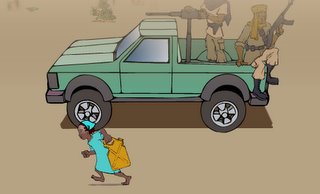
With the dirtiest stain on the global concience going almost unremarked this election season as we worry about North Korean pop-gun nukes, nefarious Iranians, and bellum uninteruptus in Iraq, I thought I would highlight a story that first emerged last spring about a free video game designed to highlight the ongoing disaster in Darfur.
Working on the theory that in an age of 24 hour ADD news networks and an editorial preference for the purient over the substantial the young and potentially idealistic were lacking opportunities to fully understand the tragic narratives of our times, students at the University of Southern California developed the video game Darfur is Dying in order to offer kids raised on PS2s the means to get engaged. The Darfur game launched last May and was played by more than 700,000 people in its first month online. This lead directly to tens of thousands of emails from players to legislators demanding action on the crisis. The format proved so popular that there is now a game dedicated to the ongoing conflict between Palestinians and Israelis.
The BBC quotes Sheila Moorcroft, a British futures research consultant, as saying these sort of games have a definite impact, noting:
...She (Moorcroft) understood that on one level people could feel that making a game out a conflict situation "trivialises" it. But she added that younger people are not engaged with traditional politics, and additionally get their information about the world in new ways. This actually makes games a good platform for exploring the complexity of an issue, she said.
"An awful lot of what is in the media today is simplistic - it's headlines, it's soundbites," she said. "People don't actually have a chance to explore the complexities of some of the situations of a conflict. In the Darfur Is Dying game, you're someone collecting water and you've just got to use your arrows and space bar to hide from the patrols. Suddenly you realise - as happened, because people started phoning up - this is for real, this is serious."
I'm all in favour of this approach. It is all too easy (and oddly satisfying) to wring one's hands and bemoan the disengagement of youth/the general public/one's neighbours/the media but all that angst does little to change the paradigm one objects to. It is much better to move towards the disengaged with the means of perking interest than try to drag them towards you. Time is too pressing to attack others for not being like you; instead we should surpress our egos a little and keep our eyes on the ultimate goal.



5 comments:
As someone who typically had a negative "knee-jerk" response to all things video, particularly when it came to my perception that it was a corrupter of "young skulls full of mush" (one of the few things I can commend Rush Limbaugh for), I recently ran across something in Daniel Pink's "A Whole New Mind: Moving from the Information Age to the Conceptual Age" than has made me reconsider my former biases.
In one instance, Pink cites two Carnegie Mellon professors, who, when polling students in their classes on shared media experiences, typically cannot find a single movie that all fifty students had seen. On the other hand, one video game has been universally played by the students--Super Mario Brothers.
Some people, like John Paul Gee argue that games can actually be the ultimate learning machine.
Video game players score 30 percent higher on visual perception and that physicians can benefit from time playing video games, as game playing can help to reduce mistakes.
Pink's book lists several other components are benificial from playing video games.
So, in line with what you wrote, I'm willing to reconsider.
I think there is good and bad in all things. While accepting that content is a different matter entirely, I'm quite keen on the idea that cognitive skills and connective pathways can be enhanced by what is often dismissed as "junk" by cultural commentators (cf. the impact of the punk ethos: apparently it was the death of civilisation when it exploded on the scene). I don't know enough of the specifics to plunk down my money either way, but I do know that all of this makes me want to read Steven Johnson's Everything Bad Is Good For You. As noted in the linked New Yorker review, in it Johnson writes about reading versus video games (provocatively and with tongue at least slightly in cheek):
"Reading books chronically understimulates the senses. Unlike the longstanding tradition of gameplaying—which engages the child in a vivid, three-dimensional world filled with moving images and musical sound-scapes, navigated and controlled with complex muscular movements—books are simply a barren string of words on the page. . . .
Books are also tragically isolating. While games have for many years engaged the young in complex social relationships with their peers, building and exploring worlds together, books force the child to sequester him or herself in a quiet space, shut off from interaction with other children. . . .
But perhaps the most dangerous property of these books is the fact that they follow a fixed linear path. You can’t control their narratives in any fashion—you simply sit back and have the story dictated to you. . . . This risks instilling a general passivity in our children, making them feel as though they’re powerless to change their circumstances. Reading is not an active, participatory process; it’s a submissive one.
Damn: here's the link
I also want to recount the story of being in an arcade with my father while at the beach when I was in my teens. Watching a young layabout blast his way to a massively high score on a video game that required intense concentration, anticipation, and motor skills, dad mused that his Royal Air Force was missing a trick recruiting pilots from universities and should instead actively go after young people like the gamer we were watching....
has anyone tested activities like ping-pong or hopscotch for these sorts of results. I mean does it have to be video?
I don't have any studies to hand Skookum Joe, but seeing as both hopscotch and ping pong were popular pursuits of the boomer generation and that many boomers can't program their own clock radios my initial reaction is "no".
Post a Comment